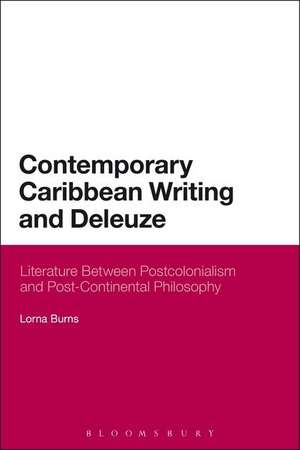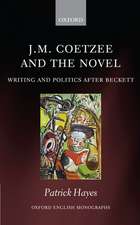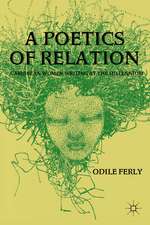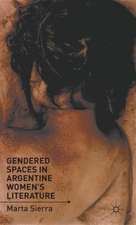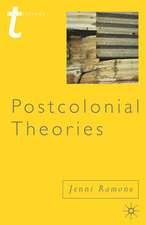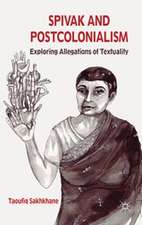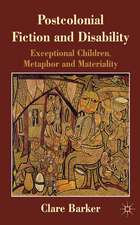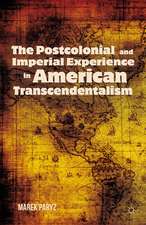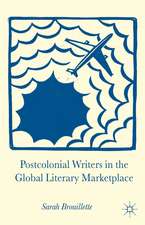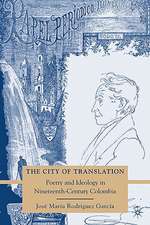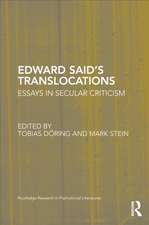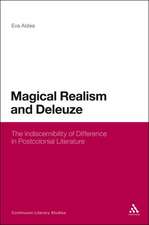Contemporary Caribbean Writing and Deleuze: Literature Between Postcolonialism and Post-Continental Philosophy
Autor Dr Lorna Burnsen Limba Engleză Paperback – 23 apr 2014
| Toate formatele și edițiile | Preț | Express |
|---|---|---|
| Paperback (1) | 256.67 lei 6-8 săpt. | |
| Bloomsbury Publishing – 23 apr 2014 | 256.67 lei 6-8 săpt. | |
| Hardback (1) | 773.06 lei 6-8 săpt. | |
| Bloomsbury Publishing – 18 iul 2012 | 773.06 lei 6-8 săpt. |
Preț: 256.67 lei
Preț vechi: 330.74 lei
-22% Nou
Puncte Express: 385
Preț estimativ în valută:
49.11€ • 51.28$ • 40.65£
49.11€ • 51.28$ • 40.65£
Carte tipărită la comandă
Livrare economică 04-18 aprilie
Preluare comenzi: 021 569.72.76
Specificații
ISBN-13: 9781472569554
ISBN-10: 1472569555
Pagini: 224
Dimensiuni: 156 x 234 x 12 mm
Greutate: 0.32 kg
Editura: Bloomsbury Publishing
Colecția Bloomsbury Academic
Locul publicării:London, United Kingdom
ISBN-10: 1472569555
Pagini: 224
Dimensiuni: 156 x 234 x 12 mm
Greutate: 0.32 kg
Editura: Bloomsbury Publishing
Colecția Bloomsbury Academic
Locul publicării:London, United Kingdom
Caracteristici
Brings together postcolonial and postcontinental approaches to establish a new critical discourse for Literary Studies.
Notă biografică
Lorna Burns is Lecturer in Postcolonial Literatures at the University of St Andrews, UK
Cuprins
Introduction: How Newness Enters the World \ 1. Surrealism and the Caribbean: a Curious Line of Resemblance \ 2. Writing Back to the Colonial Event: Derek Walcott and Wilson Harris \ 3. Édouard Glissant's Poetics of the Chaosmos \ 4. Postcolonial Literature as Health: Robert Antoni and Nalo Hopkinson \ Notes \ Bibliography \ Index
Recenzii
[This book] should be required reading for students of postcolonial theory ... [I]mportant, challenging, and a pleasure to read.
With a twin dedication to conceptual abstraction and to aesthetic creativity, Lorna Burns has produced a sustained, post-continental philosophical account of post-colonial literature, by authors such as Aimé Césaire, René Ménil, Édouard Glissant, Wilson Harris, Derek Walcott, Pauline Melville, Robert Antoni, Nalo Hopkinson, and others. An impressively sophisticated accomplishment.
Contemporary Caribbean Writing and Deleuze is a brilliant and spirited defense of the intimate relevancy of Deleuzian thought to Caribbean thinkers including Aimé and Suzanne Césaire, René Ménil, Derek Walcott, and above all, Wilson Harris and Edouard Glissant. Moving with grace and sophistication between philosophical and literary critique, Burns shows how a panoply of Deleuzian concepts inform and enrich our understanding of Caribbean literary thought and creation.
An incisive intervention in contested waters and a significant contribution to Caribbean and postcolonial studies.
With Contemporary Caribbean Writing and Deleuze, Lorna Burns has produced a sophisticated, challenging intervention in the field [of postcolonial studies] . . . To say there is much to contest in this study is less a criticism than a testament to the eloquence and force with which Burns makes her case.
With a twin dedication to conceptual abstraction and to aesthetic creativity, Lorna Burns has produced a sustained, post-continental philosophical account of post-colonial literature, by authors such as Aimé Césaire, René Ménil, Édouard Glissant, Wilson Harris, Derek Walcott, Pauline Melville, Robert Antoni, Nalo Hopkinson, and others. An impressively sophisticated accomplishment.
Contemporary Caribbean Writing and Deleuze is a brilliant and spirited defense of the intimate relevancy of Deleuzian thought to Caribbean thinkers including Aimé and Suzanne Césaire, René Ménil, Derek Walcott, and above all, Wilson Harris and Edouard Glissant. Moving with grace and sophistication between philosophical and literary critique, Burns shows how a panoply of Deleuzian concepts inform and enrich our understanding of Caribbean literary thought and creation.
An incisive intervention in contested waters and a significant contribution to Caribbean and postcolonial studies.
With Contemporary Caribbean Writing and Deleuze, Lorna Burns has produced a sophisticated, challenging intervention in the field [of postcolonial studies] . . . To say there is much to contest in this study is less a criticism than a testament to the eloquence and force with which Burns makes her case.
